The severe drought of 2009 has been devastating for all wildlife, especially for the young, whose lactating mothers lack sufficient milk to sustain their calves, and suffer death through mal-nutrition as a result
The severe drought of 2009 has been devastating for all wildlife, especially for the young, whose lactating mothers lack sufficient milk to sustain their calves, and suffer death through mal-nutrition as a result. Losses of the young of elephant society during this drought year have been terrifyingly substantial over the entire country – in Tsavo, in Amboseli, in Laikipia and throughout the naturally arid Northern frontiers. Perhaps some wiser and older elephant Matriarchs within elephant society (the few that have been spared by the ivory trade) who might have witnessed such severe conditions during their long lives have wisdom and experience to help them cope, but our hand-reared orphans have not had this luxury – raised instead by a surrogate human family from early infancy.
Many elephants in the Southern Section of Tsavo East National Park left the Park boundaries in search of browse and water during this drought year, and our now wild ex orphans hand-reared through our Nairobi Elephant Nursery, and rehabilitated from the Voi Stockades went with them, two being Emily and Edie now aged 14 and 10 respectively..
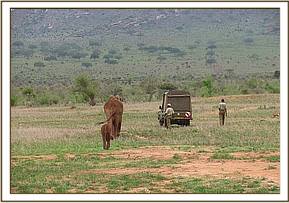
Emily was an orphan hand-reared from the tender age of just l month, whilst Edie originated from Lewa Downs in the Northern part of the country and was orphaned when she was 4 months old and her mother was poached. Both were Nursery reared and grew up together at the Voi Rehabilitation Centre where Emily became the Matriarch of many other younger elephant orphans who followed in their wake. One day she made it quite clear that she no longer felt the need to be protected in a Stockade at night, but was ready to make the transition into a wild environment, a choice that was entirely hers and which she was free to make. She took with her Edie and all the other orphans who were sufficiently confident to leave their human family and put their future in her hands. All by then were at ease with the wild herds of Tsavo, many of whom they had already befriended whilst growing up and wandering in the bush each day, accompanied by their Keepers.
On the l0th December 2008 Emily returned and came close to the Voi Stockades to give birth to her first baby fathered by a wild bull. During labour she was attended by two wild midwives as well as some of the female orphans from her unit. The Keepers happened to spot her, but were denied close proximity during the birthing process by the two wild midwives who were exceedingly protective. Emily’s baby was born either during the night of the 10th December, or the early hours of the 11th and it was a girl, whom we named “Eve”. Having remained with Emily for two days, the wild midwives left and it was then that Emily chose to bring her precious baby back to the Voi Stockades to show her human family, and allowed them the privilege of actually handling the calf when it inadvertently stumbled and fell into the stockade water trough. Thereafter, the Keepers were granted the privilege of being allowed to walk with the elephant group back into the bush, the miniature new arrival playing happily around their legs. The trust extended to the human family by Emily and the other orphans is both touching, humbling and remarkable, but then we now know that elephants are, indeed, just like us, something graphically illustrated by subsequent events.
In May 2009, during a routine surveillance patrol, the Keepers happened upon all our orphans in amongst a large number of wild elephants at Ngutuni Ranch, and ele friendly ranch bordering the Park, and were delighted to find that Edie in amongst Emily’s group also had a newborn baby, whom we named “Ella”. Both newborns were happily playing together and looked in excellent health.
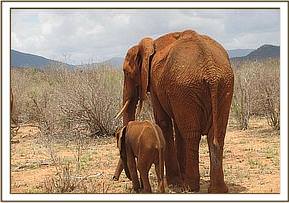

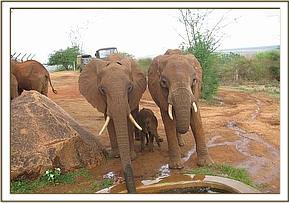
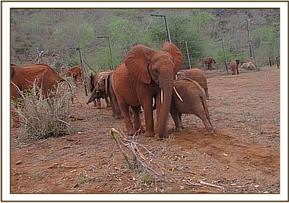

By October 2009 the ongoing drought had begun to take a very heavy toll of elephant calves in Tsavo. Tragic scenes a daily occurrence some captured on camera by our Keepers, for instance when they found a 6 to 7 year old elephant writhing on the ground, too weak to get back up onto its feet, and an adult elephant who had come to drink standing sadly by obviously fully aware that this youngster was close to death. Our Keepers lifted the youngster to its feet, and it staggered off. It is doubtful that he would have made it, and in this devastating drought year these scenes have been all too common.
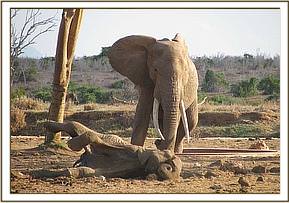
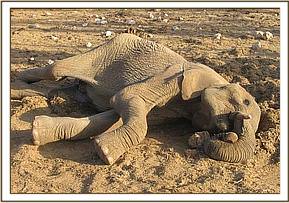
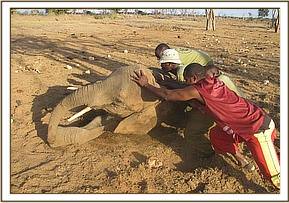

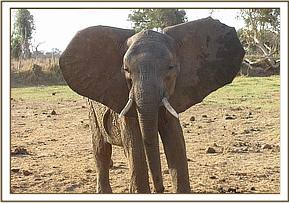
Early in October, Edie returned to the Voi Stockades with her calf looking thin and frail, its cheekbones and hip girdle prominent. She was accompanied by several other members from the older orphaned unit - Mweya, Irima and Morani. The Keepers gave her a daily hand-out of extra cut greens, Copra Cake and Dairy cubes, in an effort to fatten Edie and improve her milk bar, and the calf became visibly stronger by the day as her lactating capability improved. We marveled that Edie had brought her baby back when she knew it needed help, and that she knew that the only hope of saving her calf was to return to her human family. She had not been back to the stockades for nearly a year. Then the area experienced some rain, not nearly enough, but a green flush began to appear.
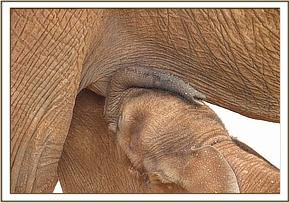
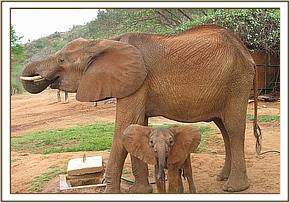

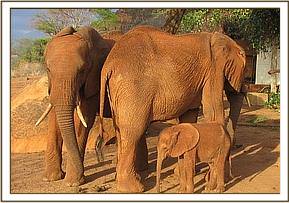

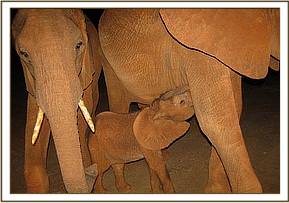

Unbeknownst to the Keepers, Emily was also trying to do the same from Ngutuni Ranch, where the orphaned herd had been during the height of the drought, like their wild kin who had obvious guided and helped them, in search of sufficient browse and water to try and see them through the drought. But, Emily only got as far as the Voi Safari Lodge when little Eve could go no further, suffering from severe drought induced emaciation and exhaustion, despite the recent green flush of vegetation that had begun to appear. It was there that our Keepers found them, and immediately alerted us in Nairobi as to the fact that Emily’s calf was in a pitiful state, desperately trying to suckle her mother in between repeatedly collapsing.
We, in Nairobi, were faced with two options – either to try and take the calf from Emily and hand-rear it in our Nairobi Nursery, which would undoubtedly entail immobilizing Emily and losing her trust forever, or to try and get both mother and baby back to the Voi Stockades where she, like Edie, could benefit from supplementary feeding to boost her milk. We decided on the second option.
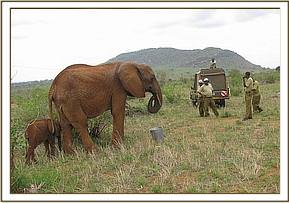
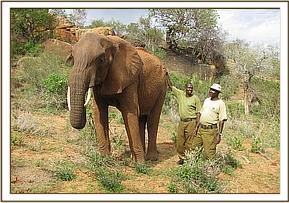


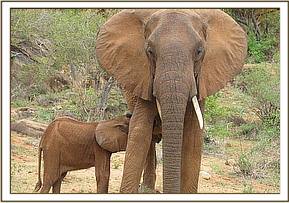
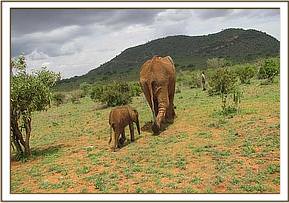
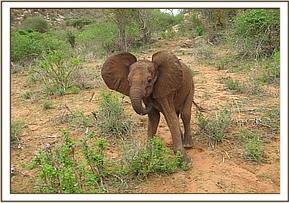
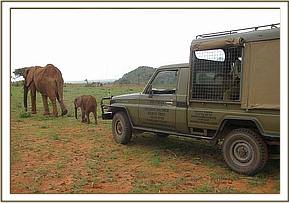

Meanwhile the Keepers had returned to the Stockades to collect some of the dairy Cubes that had been sent down for Edie, and equally as importantly, to pick up Keeper Misheck Nzimbi, the favourite of all the elephants, and a man who had known Emily from the day she arrived in the Nursery. They then all returned to Emily and her calf below the Voi Safari Lodge, where Misheck was greeted warmly. Emily then feasted on the cubes and copra cake (Coconut) before the long and laborious journey back to the Stockades began – a journey that took her and the Keepers 6 long hours to cover a distance of just a few Kms. because of the weakened state of little Eve who needed to rest frequently during the process, so much so that the Keepers feared she might collapse and die without making her first birthday. But, eventually, they made it, and there Emily was fed and watered and was reunited later unit with Edie and her baby who returned that day to the stockades as had become the recent patter, as well as Mweya, Irima and Morani, plus Lesanju’s group, 9 of the newer new ex Nursery inmates embarking on the same journey back into the wild system where they rightly belong. Since all the orphans look upon themselves as one large extended family, the greetings, as always, were touching and warm, Lesanju’s group of newcomers embraced simply as additional family members.
Emily’s baby Eve was in a worse state than that of Edie, who by that time was rapidly improving. Emily remained at the Stockades for the next two full days, during which time she was well fed with greens cut by the Keepers, and the supplements she needed to boost lactation. Her baby began to recover its strength almost visibly and was soon giving the Keepers quite a run around, but quickly understood that they were friendly and also part of the elephant family!
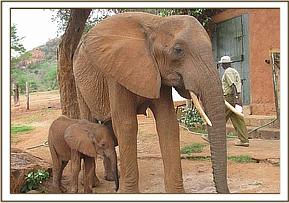


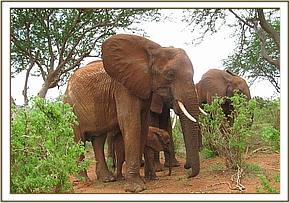

Since then, Tsavo has had more rain, and we pray for exceptional rains this year to heal the land. Emily and Edie seeking the help of their human family to save their emaciated calves during the drought of 2009 is yet another lesson for us humans, were any needed about the nature of elephants, reinforcing the fact that they are, indeed, just like us and in fact better than us in many mysterious ways that we simply still don’t fully comprehend